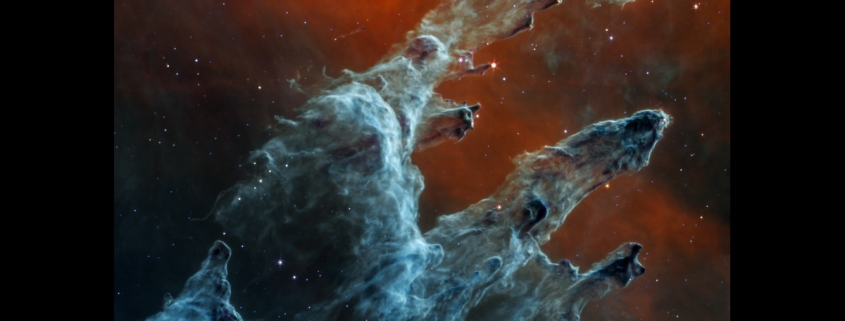Friday 2nd May 2025 The Chemistry of the Universe
The Davy lecture (The Royal Society of Chemistry)
Professor Mike G. Edmunds
Friday 2nd May 2025 7.30 pm in the BRLSI, Bath, and on Zoom
The infrared image of the Eagle Nebula was obtained using JWST. Stars are born inside the dense, blue-gray “pillars of creation” – vast clouds of dense interstellar gas and dust. Accredited to NASA.
There is the real and fascinating probability that in the future we will be confronted with extraterrestrial worlds whose physical conditions and compositions result in chemistries radically different from our own. This is the Humphry Davy Lecture, first given at the Royal Society of Chemistry in London last autumn. It outlines our current knowledge of the origin and distribution of the elements in the universe, as we try to push as far as we can into astronomical environments where complex chemistry is taking place. Currently we believe we have a remarkably good understanding of the processes and astronomical sites that have led to the formation of the elements in the periodic table. Except for hydrogen, some helium and a little lithium, all of them have been synthesised since the beginning of the universe. Recent spectroscopic observations to high redshifts are enabling us to follow their build up in galaxies from back in the earliest times to the present. The discovery of many planetary systems beyond the Solar System, and the investigation of dense interstellar environments, imply a huge unexplored range of chemical possibilities and may lead to profound implications for life in the Universe. It is suggested that extensive theoretical investigation of these enticing possibilities may be both possible and necessary.

Mike Edmunds is Emeritus Professor of Astrophysics at Cardiff University, and the immediate past-President of the Royal Astronomical Society. He was educated at Cambridge, but has lived and worked in Wales for fifty years. His research career involved the determination and interpretation of the abundances of the chemical elements in the Universe – particularly through spectroscopy of galaxies – and investigation of the origin of interstellar dust. Later work has been in the history of astronomy, including the ancient Greek Antikythera Mechanism. He was a member of two UK Research Councils. He is a Vice-President of the Herschel Society and an Honorary Vice-President of the Society for the History of Astronomy. He can occasionally be seen in his one-man play about Newton – ‘Sir Isaac Remembers…’. He was the subject of BBC Radio 4’s ‘The Life Scientific’ in April 2024, also appearing on “In Our Time” in November.
Tickets (£6 or £3 for BRLSI or Herschel Society members and students, proceeds to the BRLSI) available here.
Herschel Society Members receive a discount code in the announcement that is mailed to them.



